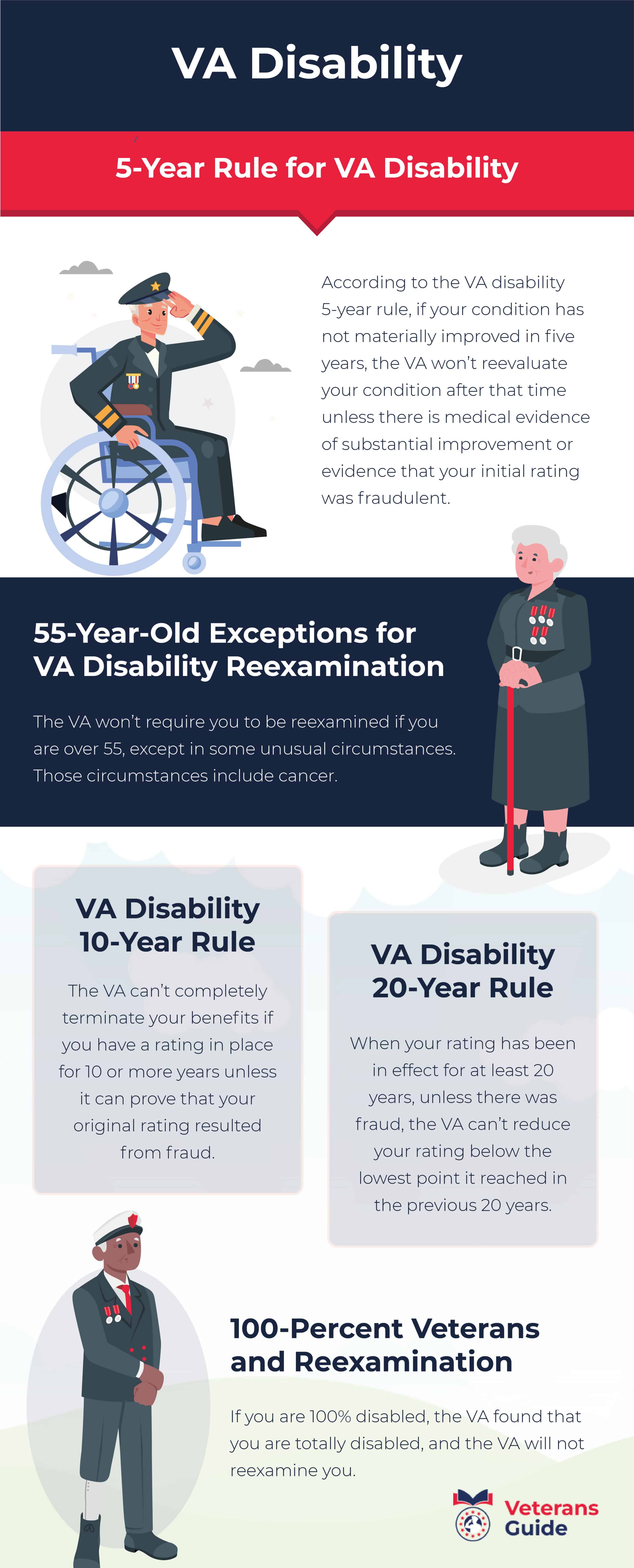Home » VA Disability » VA Disability 5-Year Rule
VA Disability 5-Year Rule
If you’re a disabled vet, the VA can order you to undergo a reexamination. If it finds your condition has improved, it can reduce your disability rating and your benefits. However, the VA disability 5-year rule helps protect you. If your condition has not materially improved in five years, the VA will not order a reexamination unless there is evidence of substantial medical improvement or fraud. Consult Veterans Guide to learn more about VA disability benefits and other resources available.
- The VA Disability 5-Year Rule protects veterans by preventing reexamination of their conditions if there hasn’t been a material improvement in five years, unless there’s substantial evidence of medical improvement or fraud.
- Even after five years, a disability rating can be reduced if the condition shows significant improvement and is not considered permanent.
- Veterans over 55 are generally exempt from reexaminations, except in certain cases like ongoing cancer treatment.
- The 10-Year Rule prevents the VA from terminating benefits after 10 years unless fraud is proven, but ratings can still be adjusted based on condition improvements.
- Under the 20-Year Rule, the VA cannot reduce a veteran’s disability rating below the lowest level it has been in the past 20 years, unless fraud is involved.
If you’re a disabled veteran, the VA can reexamine you and reduce your disability rating if your condition has improved. However, that right is not unlimited—the VA disability 5-year rule and other provisions limit when the VA can order a reexamination.
Veterans Guide provides information and resources, including connecting you with accredited VA attorneys, to help you get the veteran’s disability benefits that you deserve. We serve veterans throughout the United States and offer the guidance you need for a successful outcome.
The 5-, 10-, and 20-Year Rule for VA Disability Ratings
If you’re a veteran with a service-related disability, you can apply for a VA disability rating based on the severity of your condition and your ability to work. This rating determines how much you receive in monthly compensation and other benefits.
Some conditions may improve over time. The VA has the authority to reexamine disability ratings periodically to determine if your condition has improved and to potentially reduce your rating and disability benefits accordingly. However, the VA’s authority to order reexaminations has limits. The 5-, 10-, and 20-year rules on VA disability ratings govern when the VA may require a reexamination or lower a previous rating.
What Is the 5-Year Rule for VA Disability?
According to the VA disability 5-year rule, if your condition has not materially improved in five years, the VA won’t reevaluate your condition after that time unless there is medical evidence of substantial improvement or evidence that your initial rating was fraudulent.
The VA has the right to reevaluate your condition within two to five years after your initial examination, but only if your condition is expected to improve.
Congress enacted the VA disability 5-year rule so that the VA would not spend resources continually checking on veterans’ medical conditions when those conditions are unlikely to get better. The rule also protects veterans from unfair reductions in their disability benefits.
Can the VA Reduce a Rating After 5 Years?

55-Year-Old Exceptions for VA Disability Reexamination
The VA won’t require you to be reexamined if you are over 55, except in some unusual circumstances. Those circumstances include cancer. If you have cancer, the VA will still follow up with periodic examinations to evaluate your treatment’s after-effects.
VA Disability 10-Year Rule
VA Disability 20-Year Rule
100-Percent Veterans and Reexamination
If you have received a 100-percent rating, that means you are totally disabled. If you are rated 100 percent disabled, and your condition is permanent—meaning there is close to no chance that you can improve—then you are considered to have a permanent and total disability. If you have a permanent and total disability, the VA will not reexamine you.
VA Medical Reexamination
To reduce a disability rating, the VA must find medical evidence your condition has improved. The VA must also review your entire history and find a change in your condition—not just a temporary reduction of symptoms—before it can change your rating.
What Happens During a Reexamination?
A medical professional will conduct the reexamination. They can conduct the reexamination in several different ways. Depending on how the VA decides to proceed, the medical professional may do any of the following:
- Perform a physical exam in person
- Observe you in the hospital
- Request you undergo X-rays or lab tests
- Question you over the phone
- Review your medical records without a physical exam or phone call
If you miss your reexamination exam, the VA may reduce or terminate your benefits. You will receive a letter informing you of your scheduled exam. If you can’t attend on the scheduled date, call the VA at the number on the letter to reschedule.
Sometimes, the VA may mistakenly send you a letter scheduling a reexamination even if the 5-, 10-, or 20-year rule or another provision shields you from reexamination. If that happens, call the VA at the number on the letter or contact a VA disability lawyer for help.
How Can Veterans Prepare for a Rating Reevaluation?
If the VA has ordered a rating reevaluation, prepare by gathering documents and other evidence showing the extent of your condition. This evidence may include your medical records, test results, and statements from people who see you regularly.
A VA disability lawyer can advise you on what documents you need and how best to prepare for your reevaluation. Such preparation will allow you to show why your benefits should not be reduced.
How Can a VA Disability Lawyer Help?
A VA disability lawyer can help you prepare for a rating reevaluation to give you the best chance at maintaining your rating and benefits. A lawyer can also help if you have recently undergone a reexamination.
After a reexamination, the VA must follow certain formal steps before reducing your rating and benefits. You have the right to a hearing or to submit evidence before the VA makes its rating decision.
After that process, you have additional rights if the VA reduces your rating. Just as you can appeal your initial disability rating, you can also appeal any reduction in your rating. A VA disability lawyer can help you decide how to proceed, guide you through the entire process, and fight for your right to retain your disability benefits.
If the VA reduces your rating for medical improvement but your condition later worsens, you can request that the VA raise your rating and increase your benefits. A VA disability lawyer can advise you on whether to pursue this option and, if you do, help prepare your claim.
Contact Veterans Guide for Help
If you are concerned about having your rating reduced and feel you are entitled to keep or increase your current rating, contact Veterans Guide today. We provide trusted information, resources, and access to VA disability lawyers to help you pursue the accurate VA disability rating you deserve.
Call us at (888) 982-1009 or fill out the contact form on our website.
Client Reviews
 ANN WILLIAMS
ANN WILLIAMS  SHELLY DONNETT'E
SHELLY DONNETT'E Want to Increase Your VA Rating?



